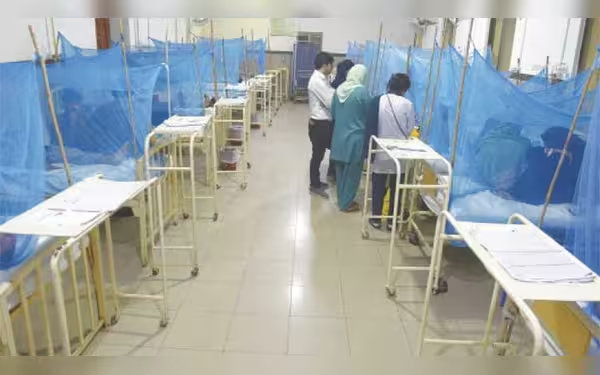Saturday, November 16, 2024 09:28 PM
Rawalpindi Sees Surge in Dengue Cases with 1,934 Infections
- Rawalpindi reports 1,934 dengue cases.
- Health officials urge community cooperation.
- Preventive measures are crucial during monsoon.
 Image Credits: dunyanews.tv
Image Credits: dunyanews.tvRawalpindi faces a dengue crisis with 1,934 reported cases, prompting urgent health measures and community action.
In recent weeks, the city of Rawalpindi has been grappling with a significant surge in dengue fever cases, with reports indicating that the total number of patients has reached a staggering 1,934. This alarming rise in infections has prompted local health authorities to take immediate action to address the situation and protect the community.
During a recent meeting held at the deputy commissioner's office, key officials, including Prof Dr Waseem Akram and Deputy Commissioner Rawalpindi Hasan Waqar Cheema, gathered to review the current dengue situation. The meeting aimed to assess the ongoing efforts to combat the outbreak and strategize on further preventive measures. The presence of the CEO of Health, Rawalpindi, and other relevant officials underscored the seriousness of the matter.
Dengue fever, transmitted by the Aedes mosquito, poses a significant health risk, especially during the monsoon season when stagnant water becomes a breeding ground for these insects. The symptoms of dengue can range from mild fever to severe illness, making it crucial for residents to remain vigilant and take necessary precautions.
Health officials have been actively working to raise awareness about dengue prevention, urging citizens to eliminate standing water around their homes and use mosquito repellents. Community engagement is vital in these efforts, as collective action can significantly reduce the mosquito population and, consequently, the number of dengue cases.
As the situation develops, it is essential for residents to stay informed and adhere to health guidelines. The local government is committed to providing updates and resources to help the community navigate this challenging time. By working together, the people of Rawalpindi can help curb the spread of dengue and protect their health.
The rise in dengue cases in Rawalpindi serves as a stark reminder of the importance of public health awareness and community cooperation. It is imperative for everyone to take proactive measures to safeguard their health and the well-being of their neighbors. Together, we can overcome this challenge and ensure a healthier future for all.













